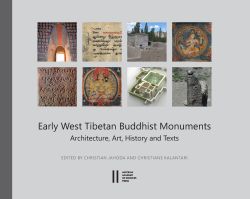Christian Jahoda - Christiane Kalantari (eds)
Early West Tibetan Buddhist Monuments
Architecture, Art, History and Texts
 Christian Jahoda
Christian Jahoda
S. 73 - 87
Verlag der Österreichischen Akademie der Wissenschaften
2021/12/23 08:18:49
Object Identifier:
0xc1aa5576 0x003d2123
Rights:All rights reserved.For questions regarding copyright and copies please contact us by email.
Dieser Sammelband befasst sich in 16 Beiträgen mit frühen, aus dem 10.–13. Jh. stammenden buddhistischen Monumenten des historischen Westtibet. Die Studien beruhen einerseits auf interdisziplinär ausgerichteten Feldforschungen in Ladakh, Spiti, Kinnaur, Tsamda und Purang (heute teils auf chinesischem, teils auf indischem Staatsgebiet liegend), andererseits auf der Erschließung und textkritischen Herausgabe von wichtigen, bislang wenig bekannten oder nicht leicht zugänglichen historiographischen Schriftquellen, u.a. von Werken des Guge Paṇḍita Drakpa Gyaltsen (1415–1486/98), die teils der Gründungsphase des westtibetischen Königreiches und dem königlichen Mönch Yesche Ö (947–1019), der religiös-politischen Hauptfigur im Westtibet des 10./11. Jh., gewidmet sind. Inhaltliche Schwerpunkte der Studien bilden nach einer einleitenden Übersicht der makrohistorischen Entwicklungen in Westtibet vom 7.-15. Jh. Beiträge zur Archäologie, Architektur, Kunst- und Gründungsgeschichte des Klosters Nyarma (10. Jh.) in Ladakh, weiters zu Stelen in Purang und Tsamda, neu entdeckten Wandmalereien des Klosters Tabo in Spiti, illuminierten Prajñāpāramitā Handschriften in Tabo und Pooh (im oberen Kinnaur) sowie zu Wandmalereien mit begleitenden Inschriften des Zhag Höhlentempels (Tsamda). Durch diesen Band wird das Verständnis der religiösen, kulturellen, politischen und gesellschaftlichen Entwicklungen des gesamten westtibetischen Sprachraums, vor allem in den formativen Phasen des westtibetischen Königreichs vom 10. bis zum frühen 13. Jahrhundert, maßgeblich erweitert und vertieft.
Veröffentlicht mit Unterstützung des Austrian Science Fund (FWF)

…
This edited volume with 16 original contributions is devoted to early, 10th–13th-century Buddhist monuments of historical Western Tibet. The results are, on the one hand, based on in-depth interdisciplinary field studies in Ladakh, Spiti, Kinnaur, Tsamda und Purang (today partly on Chinese, partly on Indian territory), on the other hand on the critical edition and analysis of hitherto unknown or inaccessible historiographical texts, among others of works by Guge Paṇḍita Drakpa Gyaltsen (1415–1486/98), which are dedicated partly to the foundation phase of the West Tibetan kingdom and the royal monk Yeshe Ö (947–1019), the leading religio-political figure in Western Tibet in the 10th/11th century. Preceded by an outline of macro-historical developments in Western
Tibet from the 7th to the 15th century, the studies focus on the archaeology, architecture, art history and foundation phase of the monastery of Nyarma (10th century) (Ladakh), in addition on stelae in Purang and Tsamda dating to the 9th and 10th centuries, newly discovered murals at Tabo monastery in Spiti, illuminated Prajñāpāramitā MSS from Tabo and Pooh (in Upper Kinnaur), as well as wall-paintings and accompanying inscriptions in the Zhag cave temple (Tsamda) from the 13th century. This volume contributes significantly to the wider and deeper understanding of the religious, cultural, political and social developments of the entire West Tibetan language area, in particular during the formative phases of the West Tibetan kingdom from the 10th to the 13th centuries.





 Home
Home
 Print
Print
 References
References
 Share
Share
 Christian Jahoda
Christian Jahoda